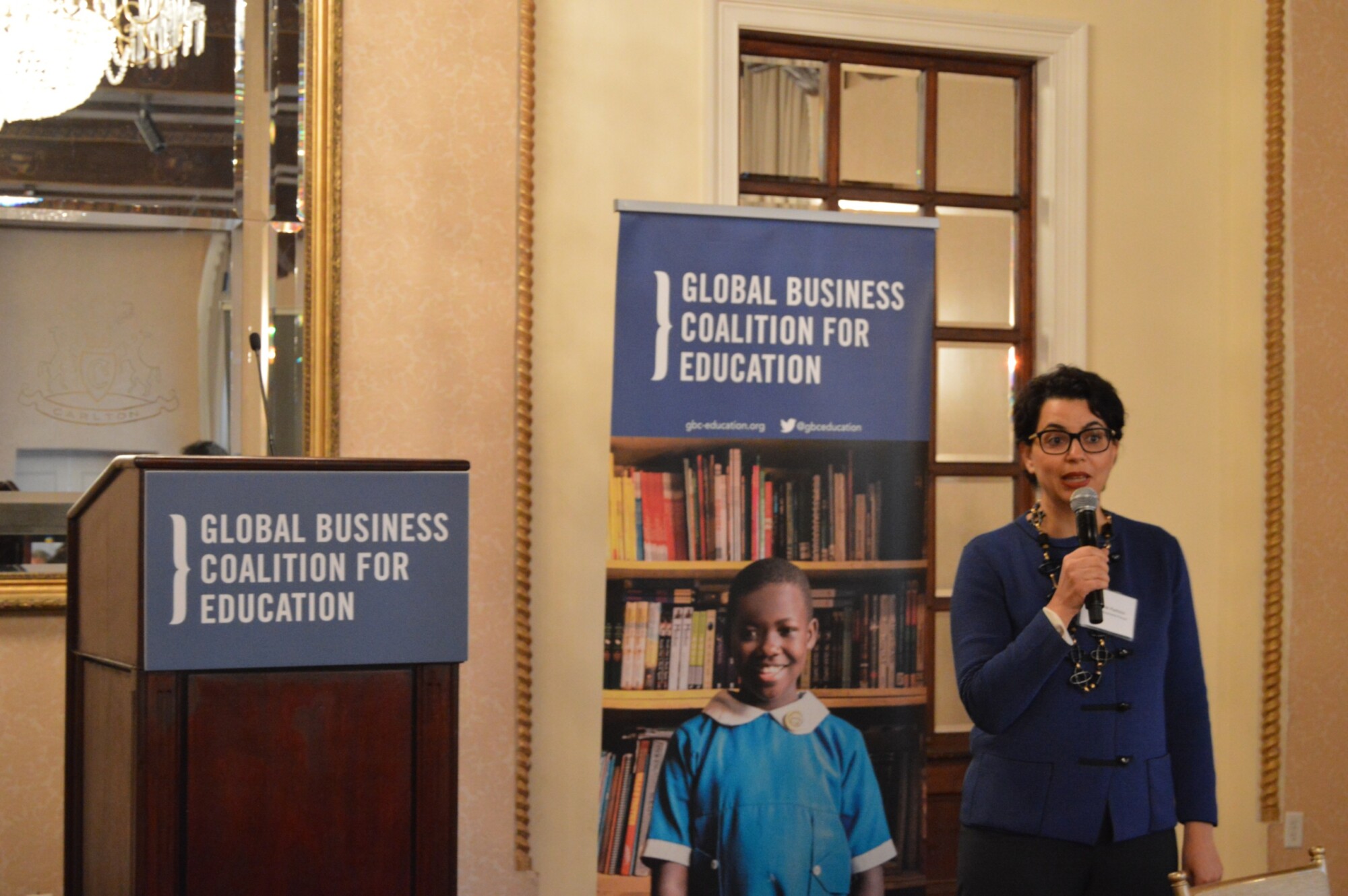GBC-Education Convenes Leaders Across Sectors to Build the #SmartInvestment Case for Education

Photo by Dan Boyer.
GBC-Education brought together some key constituencies at a special Stronger Investments, Greater Impact event Thursday morning. It was a rare opportunity for business leaders to not only attend a high-level gathering of government figures to discuss education solutions for marginalized children across the world, but to showcase their innovative work in education. They were able to learn first hand from development experts, and each other, how they can increase impact of future investments in the sector.
To reaffirm the power of public-private partnerships for education, GBC-Education Director of Global Strategy along with Advisory Board members Rosalind Hudnell of Intel and Dr. Amel Karboul of the Maghreb Economic Forum, welcomed thoughts from business leaders from IBM, Samsung, Accenture and others. Also participating in the dialogue was Kristalina Georgieva, Vice-President of the European Commission; Akinwumi Adesina, President of the African Development Bank; Eric Postel, Associate Administrator of the United States Agency for International Development (USAID); Peter Laugharn, President and CEO of the Conrad N. Hilton Foundation; Sir Ronald Cohen, CEO of Portland Trust; Elias Bou Saab, Lebanese Education Minister; Barbara Span, Vice-President of Public Affairs of Western Union; and Helle Thorning-Schmidt, Chief Executive of Save the Children International.
“We recognize that we cannot deliver these goals alone,” said Tom Fletcher of the ambitious education 2030 targets established during the UN General Assembly in September. “We have attention, but we do not have the finance in place. We are learning how to build ‘partnerships for purpose’ in the private sector.”
New to this year’s dialogue, leaders from private foundations spoke on the unique assets that philanthropic organizations can contribute to education-centered partnerships.
“We can take on the experimental, not yet ready for market, that others may be hesitant to try,” said Peter Laugharn before adding that, in addition to their core assets, the private sector can offer systematic planning, R&D, and market sensitivity. The Hilton Foundation has helped raise bilateral and multilateral funding for education solutions in Turkey.
Kasia Witkowski, Director of Government Relations, Americas, of GBC-Education member HP, shared how their New Education Assessment Technology (NETA) program has led to meaningful outcomes in closing gender gaps and inspiring economic growth through a combination of micro-economics in which on-the-ground individuals provide community support and macro-economics in which HP assesses impact.
Claudia Costin, Senior Director of Education at the World Bank, announced that together with the First Lady, they will contribute $2.5 billion within the next five years to support adolescent girls’ education in the developing world. She also highlighted that the World Bank is looking to business to support research, planning, and finance for their Early Learning Partnership program, also supported by the Children’s Investment Fund Foundation and private sector donors.
Speaking on behalf of USAID and multilateral donors, Eric Postel suggested that supporting girls’ education, providing textbooks and learning content, and financing solutions were three areas where business contributions would be more profound than transactional money. “The U.S. might be one of the two or three biggest donors for basic education around the world,” he said. “But we cannot do this [. . .] without foundations and the private sector — we have to start working at scale.”
Kristalina Georgieva spoke of the “massive injustice” aid does to refugees when it provides food and shelter but not education. “It is an injustice for millions of children. It is our moral duty and in our interest for security to address it,” she said speaking of scaling up access to education for marginalized children.
This event builds off of previous conversations GBC-Education convened in which businesses were offered the opportunity to contribute to the global education dialogue by interacting directly with leaders from governmental and non-governmental organizations.
Strategic public-private partnerships in which the private sector contributes their core assets and innovative solutions alongside the access and knowledge of the public sector to deliver education is an emerging pathway for business to contribute to global education development. Public-private partnerships that leverage the comparative advantages of each partner while sharing the associated risk and expertise to create effective, innovative, and scalable programs are crucial to delivering access to quality education to millions of children across the world and to the hardest to reach in particular, who often live in emergency and crisis situations.
Learn more about how you can GBC-Education’s support of these partnerships.
Now, the Coalition looks forward to the first-ever World Humanitarian Summit in Istanbul in May, in which world leaders will launch an education in emergencies financing mechanism alongside leaders from government, business, and civil society.
“We have to put every child in the classroom,” said Elias Bou Saab. “Sometimes, when we miss a window of opportunity, you miss an entire academic year and we lose an entire generation. And you know where they will be heading after that and that will not just affect Lebanon and the Middle East, it will affect the world.”
